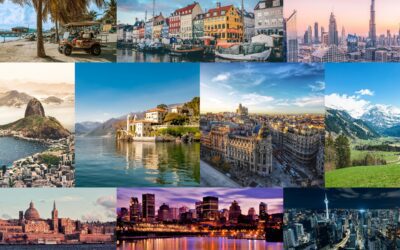|
|
There are lots of different types of digital nomads in the world with different approaches to travel, work, and managing their finances. But one common motive for many digital nomads is to find a better work-life balance, usually leveraging geo-arbitrage.
Geo-arbitrage is enjoying the higher income you can earn by being employed in one country where you can earn higher wages in a stronger currency, while living in another country with a lower cost of living. Digital nomads can then choose to work less, as they need less to get by, they can choose to live a more lavish lifestyle because it is more affordable, or they can prioritize savings with the purpose of retiring early or enabling some other kind of investment.
Until recently, geo-arbitrage has only been open to a select few, due to the need to be close to your job. But now that remote work is becoming increasingly available, more people can make this lifestyle and financial choice.
So, how exactly does geo-arbitrage work and what things do you need to consider when deciding if it is an appropriate lifestyle choice for you?
Finding the Right Job
To make geo-arbitrage work, in theory, you need to find work in countries with the strongest economies. This means that you are earning in a strong currency that is unlikely to suddenly lose value on the international market, and these countries also tend to have the highest wages.
Bear in mind that to be employed in a country, even if you aren’t physically based in that country, you generally have to have the right to work there. For example, if you want a fully remote job at a US company, you usually need a green card or other kind of work visa to qualify for the role. This is due to employment laws in the individual country. There are exceptions, but this is something to bear in mind when looking for work.
While there are exceptions to every rule and you can earn excellent incomes in country’s that are generally considered to have a weaker economy, below are a list of countries that tend to pay the highest salaries and have the most stable economies.
- United States – disposable income per capita US$58,228
- Luxembourg – disposable income per capita US$48,260
- Switzerland – disposable income per capita US$46,455
- Austria – disposable income per capita US$40,525
- Australia – disposable income per capita US$39,871
- Germany – disposable income per capita US$39,536
- Norway – disposable income per capita US$37,292
- Belgium – disposable income per capita US$35,612
- Netherlands – disposable income per capita US$35,382
- Canada – disposable income per capita US$34,305
Disposable income per capita is income available after taxes and mandator contributions such as social security.
Jobs should also be fully remote, making you fully location independent. Unfortunately, many jobs advertised as remote are better described as hybrid, as they require that you spend at least some time in the office. This can be a couple of days a week or a couple of days a month. Regardless, this can reduce the benefits of geo-arbitrage as you must retain some kind of residence in the vicinity of your work. Maintaining two homes or maintaining access to temporary accommodation in a place with a high cost of living can make a big dent in any potential savings.
Finding the Right Home
Finding the right place to live is a very personal question and depends on innumerable factors such as your preferred lifestyle, proximity to family and friends, cultural norms, and much more. But putting those personal preferences aside and looking only at the financial questions, these are the main things to consider when choosing whether a location would make a good geo-arbitrage home.
Accommodation Costs
The most common advice you will hear is that you should spend about 30% of your take home income on accommodation, whether that be rent, a mortgage, or another arrangement. While this is supposed to indicate what is generally considered manageable, it also highlights that housing is one of our major living expenses. Therefore, finding a place where you can get decent housing for less than 30% of your income is the first step. This means something that meets your needs but is also safe.
This should be considered as s separate line to cost of living as some places have a relatively low cost of living when it comes to things like food, transport, and health, but very high rents. Obvious examples are Sydney, Australia, Hong Kong, and Beijing, China.
Food
Food tends to be the next biggest expense for most people. The general recommendation is to spend about 10% of your income on groceries, so things like eating out aren’t included in that number. Because so many people prefer to eat out/order delivery, the average American spent 11.3% of their income on food in 2022, a 30 year high.
Some of the cheapest places in the world for eating are in Southeast Asia and Latin America, where both groceries and eating out can be very affordable. Countries in Western Europe and Australia also stand out for having good quality groceries at an affordable close. In most of these countries, groceries cost less than 2.5% of disposable income. Economic dynamics within Europe can mean that while Eastern European countries often have more affordable costs of living, groceries can be expensive.
Tax Rates
Tax rates is the next major consideration. First there is income tax, though whether you pay income tax in the country where you are living or the country where you are employed depends on your visa status. Countries with the highest income tax rates include Western Europe, Japan, the United States, and Australia. The lowest tax rates are in Eastern Europe, the Middle East, and the Caribbean.
There are also goods and services taxes and value added taxes that impact the overall cost of living in different places. Croatia, Denmark, and Sweden have some of the highest VAT rates in the world at 25%. Some countries charge no VAT, but the lower rate is generally around 5%, as seen in Canada and Taiwan.
Best Countries to Live for Geo-Arbitrage
With all these considered, what are the best places in the world to live for geo-arbitrage. It is worth noting that geo-arbitrage does not always have to be international, it can also be domestic. For example, in the United States you could move from expensive areas such as San Francisco and New York City to areas such as Midland Texas, where there I no income tax, Syracuse, New York, and Raleigh, North Carolina.
For international arbitrage, the most popular regions of the world are Southeast Asia and Latin America, which tend to combine great weather with an affordable cost of living. Some of the most popular countries are Thailand and Indonesia in Southeast Asia, and Mexico and Colombia in Latin America. Africa offers affordability, but many places don’t have the infrastructure that digital nomads are looking for in terms of connectivity and security. Popular exceptions include South Africa and Morocco. Finally, Europe is also on the list, especially Eastern Europe with a more affordable cost of living in areas such as Hungary and Croatia. Portugal and Spain also stand out as more affordable countries with a high quality of living.
But Is It Ethical?
Looking just at the numbers, geo-arbitrage makes sense. Imagine you have a job that gives you US$60,000 per year after tax (wherever in the world you happen to pay that). If you lived in the United States, in a moderately affordable state like Ohio, you could expect to spend at least US$30,000 of that a year on essential expenses such as food and accommodation. You could expect to spend half that or less on the same essentials in Thailand, Portugal, South Africa, or Colombia.
But is it ethical? We have recently covered several stories about popular digital nomad and ex-pat countries complaining about the influx of foreigners because it pushes up prices for the locals and results in gentrification that can drastically alter communities. It is debatable whether digital nomads are the real cause of these issues, but they are an obvious symptom. But at the same time, foreigners can also bring wealth and opportunity into the area.
Whether geo-arbitrage is an ethical decision is something that each person must decide for themselves. But if you do choose this lifestyle, it is important to live and travel consciously, buying locally, supporting local businesses, and choosing to integrate with rather than exploit the community around you.












